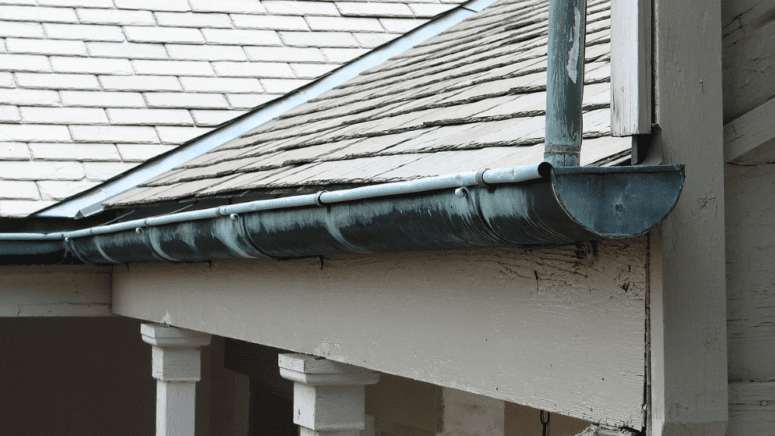Do Gutters Increase Home Value? Here’s How Top Appraisers Assess the Water Shields of the House
- Published on
- 7 min read
-
 Jennifer Billock, Contributing AuthorClose
Jennifer Billock, Contributing AuthorClose Jennifer Billock Contributing Author
Jennifer Billock Contributing AuthorJennifer Billock is an award-winning writer, best-selling author, and editor. She is currently dreaming of an around-the-world trip with her Boston terrier.
-
 Joseph Gordon, EditorClose
Joseph Gordon, EditorClose Joseph Gordon Editor
Joseph Gordon EditorJoseph Gordon is an Editor with HomeLight. He has several years of experience reporting on the commercial real estate and insurance industries.
Quality gutters are the unsung champions of real estate. While they may not receive the same praise as a property’s landscaping or tile choices, they play a crucial role in maintaining a home’s structural integrity.
Every day, 14,000 homeowners face water emergencies, while one in every 60 insured homeowners have filed claims due to water issues. According to Consumer Affairs, insurance companies pay out $13 billion dollars each year for water damage claims with the average household claim costing about $12,514. This number doesn’t include homeowners whose damage wasn’t covered and needed to pay for water damage out of pocket. Gutters serve the critical role of pushing water where it needs to go: away from the home to avoid foundation erosion and roof leaks.
“When I go out to appraise a property for a lender, they will almost never lend on a property that doesn’t have gutters and downspouts that are functional,” said Jerin Harper, a state certified home appraiser in Washington with 16 years of experience.
“In this instance, I would be required to provide a ‘cost-to-cure,’ which is an estimate to install or repair gutters and downspouts. The cost-to-cure figure can then be subtracted from the overall home value.”
So, do gutters increase home value? Not exactly, because they’re like the tires of a car: Buyers expect a property to have them in good working condition, or they’ll pay less for it.
We’ll help you get your gutters in top condition with insights from leading appraisers nationwide. They will explain:
- How gutters protect your home from ice dams and foundation issues
- The impact of dirty or damaged gutters on your home’s value
- Expert tips on selecting gutter materials, installation, and add-ons to maximize your investment
Protecting against ice damming and foundation erosion
Imagine you’re sitting in your living room on a chilly winter day watching television, when suddenly you feel a drop of water on your head. You look up to find a wet patch spreading out on your ceiling just above you.
Or, picture this: It’s been a stormy few days with lots of rain. You go outside to clean up after the storm, and to your horror, you find that some of your foundation has washed away — but only in one spot that should have been difficult for the water to reach.
The culprit in both situations? In most cases, bad gutters. Properly constructed and clean gutters are essential to preventing water damage to your home.
The first scenario is likely due to an issue called ice damming, where the water melting from a warmer part of your roof can’t escape. This typically happens when gutters haven’t been cleaned out properly. The water freezes and the excess ice accumulates under your shingles, damaging the attic or ceiling in your home as it melts.
The second scenario likely is due to a broken gutter or a missing downspout. The water is dumping down onto your foundation instead of getting pushed away from the house.
“You need to have gutters because you’re going to start affecting your foundation significantly if you don’t direct water away appropriately,” said Brett Young, a top-selling agent in Indianapolis. “It’s not an option out here, honestly. If you’re buying a house that doesn’t have gutters on it, it’s probably because it’s a bank sale home and it’s all beat up.”
Granted, some locations don’t need gutters as much as others, like Arizona, for example.
No gutters or gutters in poor condition will lower your home’s value
A lack of gutters or gutters in poor condition can harm your home and decrease its sale value. Whether they’re missing, dirty, broken, or improperly installed, faulty gutters compromise your home’s longevity and affect its appraisal value when selling..
“Gutters are part of the real estate, but there’s not a specific adjustment line for gutters,” said Michael A. Keough, a 38-year residential home appraiser in New Jersey. “If the lack of gutters is ruining something, you’ll detract from that item.”
In some cases, the missing or damaged gutters can even end a sale before it begins.
Quality gutters attract buyers but don’t add value
Gutters themselves typically won’t increase your home’s value. They’re a standard feature, especially in rainy areas, and having them is expected rather than exceptional.
“People don’t just normally install gutters for the aesthetics of the gutters,” said Edmond “Buddy” Eslava, a nationally renowned appraiser with The Appraisal & Consultant Group in Daphne, Alabama.
“If you needed them and didn’t have them, it would detract value. But having them won’t add value.”
However, you can enhance the perceived value of your home by ensuring your gutters are properly installed.
There are two key factors to consider. First, proper gutter installation ensures water is diverted far from the house to prevent damage to the foundation and siding. Second, gutters must be level to prevent water from pooling. Pooling water can attract mosquitoes, other pests, and cause ice damming.
Match your gutters to your home
Just like any other part of your property, including outbuildings, shutters, garages, and even gazebos, you’ll want to make sure the color and size of your gutters are appropriate for your home.
Gutters are usually matched to the color of the outdoor trim. Regarding size, Young notes that while the standard used to be four inches, it has now increased to six inches — so opt for the larger size.
Eslava agrees, noting that eight-inch gutters are also available and are a better choice than six-inch gutters. However, if your house is smaller and large gutters would look out of place, stick with the smaller size.
It’s also critical to have enough downspouts. The general rule is one downspout for every 35 or so feet of gutter.
Stick with the standard gutter materials
Seams are out. If you want gutters that will bring value to your home, skip them and go for a seamless option. It looks tidier and more professional. Typically, gutters are metal or aluminum; the actual material doesn’t matter much as long as the gutters are sturdy, functional, and match your house. Each material does have pluses and minuses, though.
Aluminum:
These resist corrosion and are relatively inexpensive, plus they’re lightweight and the standard material. But they can have strength issues and may break under pressure.
Metal, such as copper or steel:
These types of gutters are heavy, expensive, and difficult to install. But they’re stronger than aluminum and work well for matching a certain aesthetic on the outside of your home.
Vinyl or plastic:
These are generally the cheapest type of gutter and they’re easily installed, but they come with several drawbacks. They can discolor easily, and they’re the weakest of the top three options.
Get gutter guards:
Gutter guards are covers that go over your gutters to stop debris from building up inside them. These are your first line of defense if you live in a heavily wooded area or have a lot of trees near your house.
They’ll stop leaves and sticks from getting in, and will keep squirrels and their seeds out, so you don’t have to worry about looking up one day to see a patch of sunflowers sprouting from the edge of your roof. As a plus, Young says having gutter guards could add value to a home appraisal.
Skip the rain collection system:
Well, unless you really want one. Young notes that rain barrels or collection systems typically don’t increase a home’s value, even though some buyers may appreciate them. Since preferences vary, it’s best to choose based on your personal preference.
While proper gutter maintenance and repair may not be the most glamorous aspect of homeownership, it is crucial for preserving your home’s value for years to come.
Header Source : (Mark Gstohl / Flickr via Creative Commons Legal Code)






